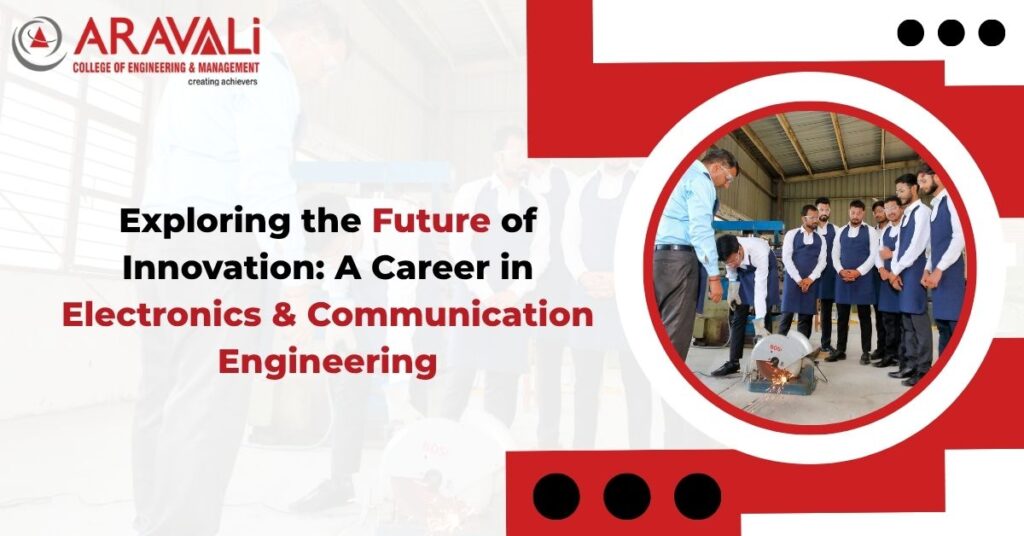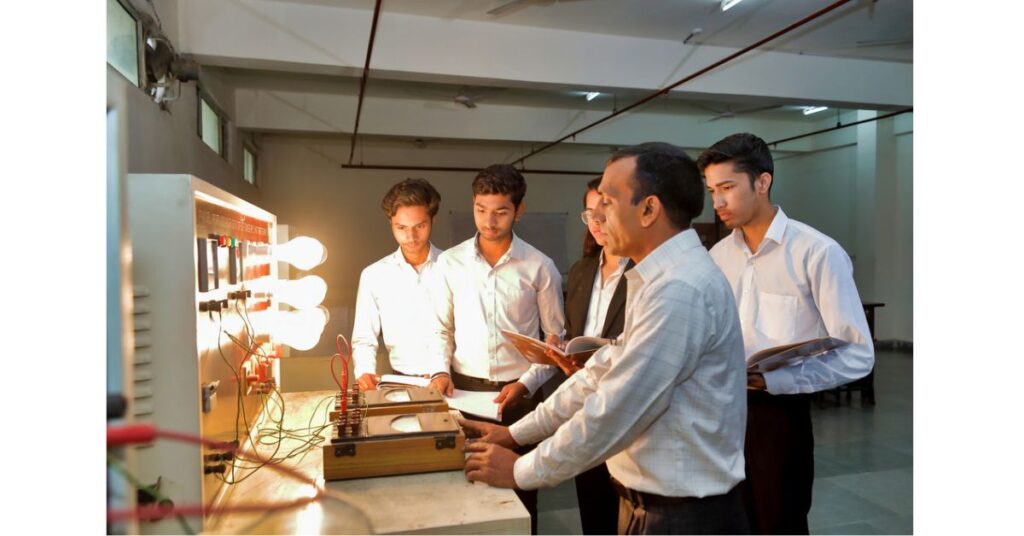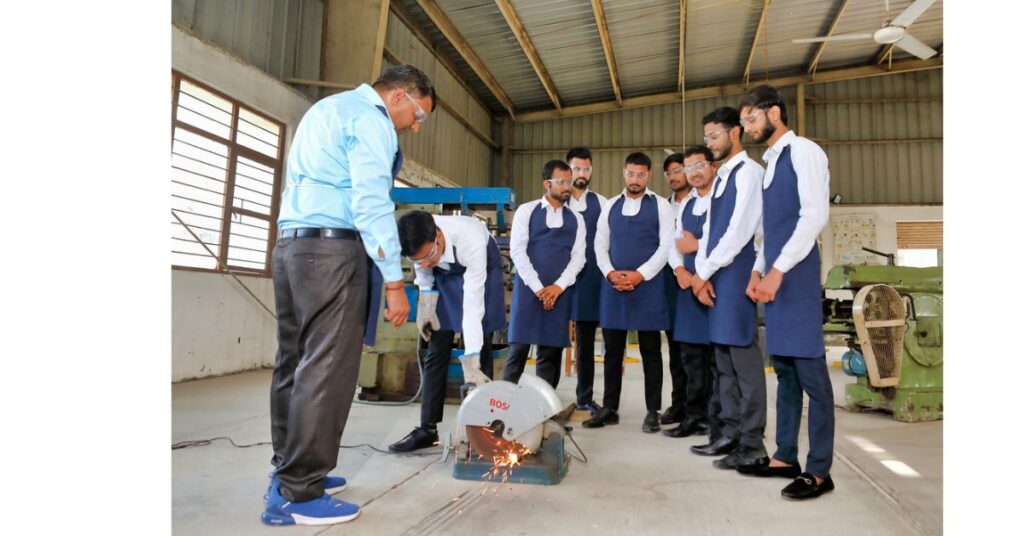
In today’s digital associated and technically advanced world, the importance of Electronics and Communication Engineering (ECE) cannot be overseas. From smartphones to satellites, from high-speed internet to wireless communication, ECE’s contribution shapes our everyday life. In electronics and communication engineering, students are provided an exciting pathway to enter dynamic areas such as telecom, IT, automation, healthcare tech, defense systems, and more by extending B.Tech.
What do you Know About Electronics and Communication Engineering (ECE)?
Electronics and Communication Engineering is a branch of Engineering that is not only related to the design, development, and implementation of electronic circuits, but also with equipment and communication systems. ECE plays an important role in enhancing the efficiency and access of communication equipment, computing platforms, and automation technologies.
Students learn about:
- Electronic devices and circuits
- Integrated circuits (ICs)
- Analog and digital transmission (AM, FM, DTH)
- Microprocessors and microcontrollers
- Antennas and wave propagation
- Satellite and microwave communication
ECE Scope and Application
ECE is not limited to communication technologies only. Its applications are huge and cover a wide range of industries:
- Telecom and Networking: Mobile Network, Broadband, 5G technologies
- Consumer Electronics: Smartphone, Wearables, Home Application
- Embedded System: Automotive Electronics, IOT device, Smart Home
- Aerospace and Defense: Radar system, avionics, satellite tech
- Healthcare: Biomedical instruments, diagnostic devices
- Industrial Automation: Robotics, procedure control system
With the increasing use of electronic and communication systems in every field, ECE engineers remain in high demand in the public and private sectors.
Why Choose B.Tech in ECE?
Pursuing B.Tech in Electronics and Communication Engineering provides a balanced mix of theoretical knowledge and practical skills. There are some major reasons why students choose the option of this course:
- Foundation in both hardware and software technologies
- Versatility to work in multiple industries
- Opportunity for research and innovation
- High employment potential in India and abroad
- Strong prospects in emerging technologies like AI, IoT, and 6G
If you are looking for a solid engineering discipline with a scope of a broader career, then admission to the top private B.Tech ECE College in Faridabad may be your launchpad.
Year-Wise Course Curriculum Breakdown
Year 1: Basic concepts
In the first year, students are introduced to the basics of electronics and electrical engineering. Core modules include:
- Electronics Engineering Element
- The basics of Electrical Engineering
- Workshop Technology (with CROs, Function Generator, Rectifier Assembly)
Hands-on lab sessions make up the core of the learning process to prepare students for advanced modules.
Year 2: Intermediate Electronics and Theory

In the second year, students dive deeply into component-level understanding:
- Study of BJTs, MOSFETs, Diodes
- Analog & Digital Electronics
- Network Theory, Laplace Transformation, and Circuit Analysis
- Electromagnetic Theory and Maxwell’s Equations
- Introduction to Wave Propagation
Students gain experience in the practical design and testing of analog and digital systems.
Year 3: System Design and Integration
The third year emphasizes design, integration, and micro-level processing:
- Digital System Design
- Operational Amplifiers, 555 Timers, and PLL
- Microprocessors, Microcontrollers & Embedded C
- Introduction to VLSI Design and CMOS Circuits
- Microwave and Radar Engineering (Klystrons, Magnetrons, TWT)
This year is important to develop problem-solving and system simulation skills.
Year 4: Advanced technologies and expertise
Final year students focus on advanced subjects and real-time system applications:
- Digital Signal Processing (DSP)
- Satellite and Optical Fiber Communication
- Mobile & Wireless Communication
- Performance Metrics, Frequency Domains, and Transfer Functions
- Industrial Training/Project (4-month duration)
Students are equipped with the ability to implement ECE knowledge in real-world scenarios through compulsory training or project work.
Major skills you get from an ECE program

An ECE graduate does not go away with technical knowledge only, but a diverse skill set, including:
- Analytical thinking and circuit design
- Communication and presentation skills
- Engineering Projects
- Important thinking and troubleshooting
- Programming in Embedded C and Hardware Simulation
- Familiar with devices like MATLAB, PSPICE, and Xilinx
These skills are suitable for ECE graduates in core and interdisciplinary roles.
Career Opportunities After B.Tech ECE
An ECE degree unlocks various career paths. Some lead roles include:
- Electronics engineer
- Communication system analyzer
- VLSI Design Engineer
- Network plan engineer
- Embedded system developer
- R&D engineer
- Technical advisor
- IOT system designer
- Control system engineer
Whether you are interested in working with a global MNC or a rapid speed startup, ECE provides flexibility and development.
Industries That Hire ECE Graduates
ECE engineers are essential in various types of areas. Graduates often get placements:
- Consumer Electronics Manufacturing
- Telecommunications and Mobile Networks
- IT Services and Consulting
- Healthcare Equipment Manufacturing
- Internet and Cloud Technologies
- Automotive and Mechatronics
- Power Electronics and Energy Management
- Defense and Military Tech Development
- Industrial Control Systems
Engineers can also work in design, maintenance, technical sales, or project management areas.
Why Aravali College of Engineering and Management?
Located at the center of Delhi NCR, Aravali College of Engineering and Management is widely recognized as the Best ECE College in Faridabad. Here’s why students rely on Aravali for their engineering trip:
- Industry-Equal Course: Courses Updated for Modern Electronics and Communication Technologies
- State-of-the-art Labs: well-equipped laboratories for analog, digital, microwave, and embedded system experiments
- Expert Faculty: A team of experienced mentors guiding students through academic and industry trends
- Project-Based Learning: Emphasis on projects and industrial training with hands-on in the final year
- Strong Placement Support: Tie-up with leading organizations for on-campus recruitment
- Affordable Education: Transparent and competitive fee structure
Fee Structure (Academic Year 2025-26)
- Course fee: ₹ 1,00,000/-
- University fees: ₹ 8,500/- (variable)
- Security Fee: ₹ 4,000/- (Returnable)
Hostel facility:
- AC Room: ₹ 80,000/-
- Non-AC rooms: ₹ 65,000/-
- Security deposit: ₹ 4,000/-
Transport Facility:
- Transport fee depends on the location of the student.
Conclusion
Electronics and Communication Engineering is one of the most versatile and future branches in the field of technology. With a course that balances theoretical concepts and real-world applications, ECE students graduate with a competitive edge in the job market.
If you aim to carry forward your B.Tech in a college that gives importance to innovation, hands-on learning, and career advancement, then Aravali College of Engineering and Management stands out as the top private B.Tech ECE college in Faridabad. With its strong industry links, modern features, and student-centered approaches, Aravali is the ideal launchpad for future engineers who want to make a mark in the electronics and communication landscape.